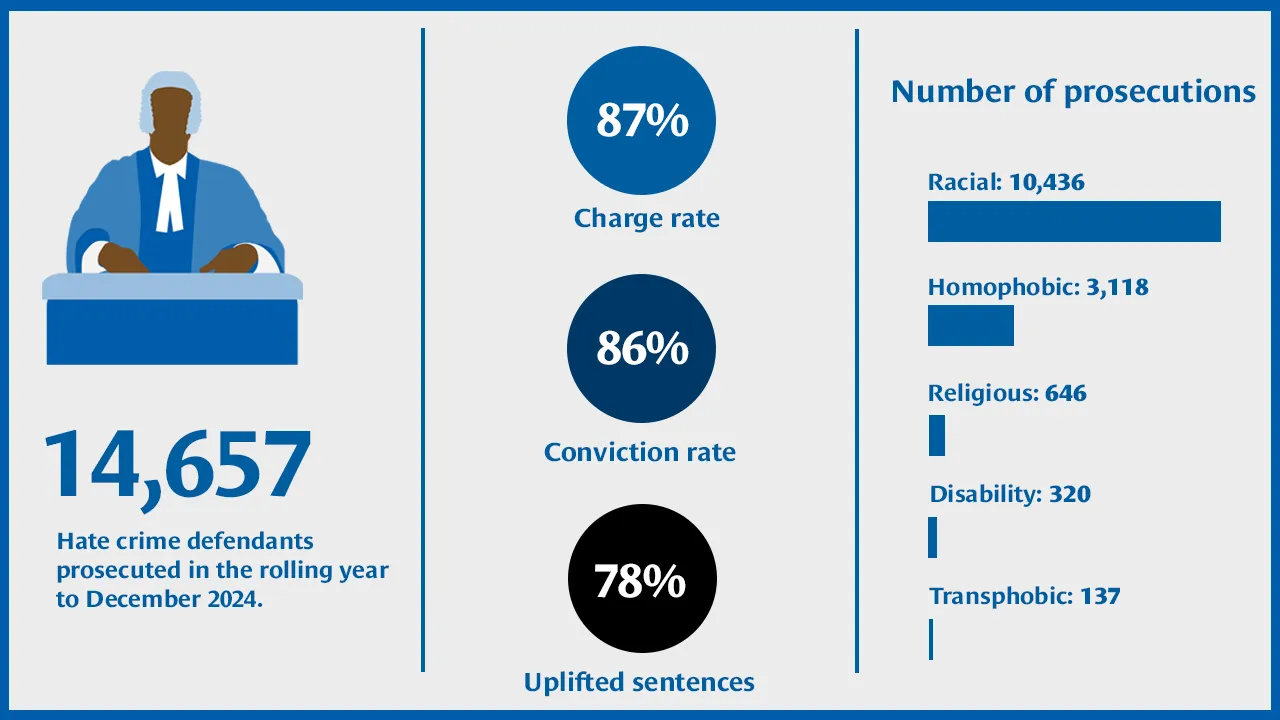Hate crime
The law recognises five types of hate crime on the basis of:
- Race
- Religion
- Disability
- Sexual orientation
- Transgender identity
Any crime can be prosecuted as a hate crime if the offender has either:
- demonstrated hostility based on race, religion, disability, sexual orientation or transgender identity
Or
- been motivated by hostility based on race, religion, disability, sexual orientation or transgender identity
How to report hate crime
If you or someone else is in immediate danger, call 999.
If it isn’t an emergency, you can report hate crime by calling the police on 101 or by filling in an online form at report-it.org.uk
Support for victims and witnesses
There is a wide range of organisations who support victims and witnesses of hate crime. You can find out more about some of these organisations on their websites.
Some charities can also support you to report hate crime:
- Stop Hate UK stophateuk.org
- Tell MAMA (anti-Muslim hate crime) tellmamauk.org
- Community Security Trust (antisemitic hate crime) cst.org.uk
- Galop (anti-LGBTQ+ hate crime) galop.org.uk
Someone can be a victim of more than one type of hate crime.
These crimes are covered by legislation (Crime and Disorder Act 1998 and section 66 of the Sentencing Act 2020) which allows prosecutors to apply for an uplift in sentence for those convicted of a hate crime.
The police and the CPS have agreed the following definition for identifying and flagging hate crimes:
"Any criminal offence which is perceived by the victim or any other person, to be motivated by hostility or prejudice, based on a person's disability or perceived disability; race or perceived race; or religion or perceived religion; or sexual orientation or perceived sexual orientation or transgender identity or perceived transgender identity."
There is no legal definition of hostility so we use the everyday understanding of the word which includes ill-will, spite, contempt, prejudice, unfriendliness, antagonism, resentment and dislike.
What’s the role of the CPS in prosecuting hate crime?
The police investigate and obtain evidence to show a crime has been committed.
In hate crime cases this includes gathering evidence that the victim has been targeted because of their race, religion, disability, sexual orientation and/or transgender identity or because of what the offender believes to be their race, religion, disability, sexual orientation and/or transgender identity.
The CPS is responsible for deciding which cases go to court. This includes taking a decision on whether there is enough evidence to prosecute a crime as a hate crime.
If an offender pleads not guilty the CPS are responsible for preparing and presenting the case against them at court.
In hate crime cases the CPS is also responsible for asking the courts to increase the sentence that an offender receives – to reflect the fact that the crime they committed was a hate crime.
Hate Crime - what it is and what we're doing about it
Prosecuting Disability Hate Crime: a case study
Prosecuting Homophobic and Transphobic Hate Crime: case studies
How do we deliver justice for victims of hate crime from the LGBT+ community? Read the latest hate crime cases we’ve prosecuted.
Crimes Against Older People
Whilst crimes against older people do not fall under hate crime legislation, our approach to dealing with these crimes has much in common with how we tackle hate crime. People can also be a victim of a crime against an older person and hate crime. For these reasons, you’ll find our policy and guidance for prosecuting crimes against older people below.
Hate Crime External Consultation Group
Our Hate Crime External Consultation Group (ECG) provides advice, support, and challenge to our work on hate crime.
National Community Newsletter
Sign up to receive our latest Community Newsletter, including updates on Hate Crime, on a regular basis.
Prosecution guidance
Read how the CPS goes about prosecuting the different strands of Hate Crime in our Prosecution Guidance section
Public policy statements on hate crime
Our public policy statements explain the way we deal with and prosecute hate crimes and what victims and witnesses can expect from us.
